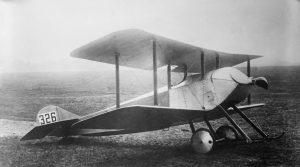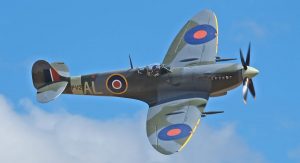Finest Hour 185
Churchill’s Greatest Triumph: Bomber Command
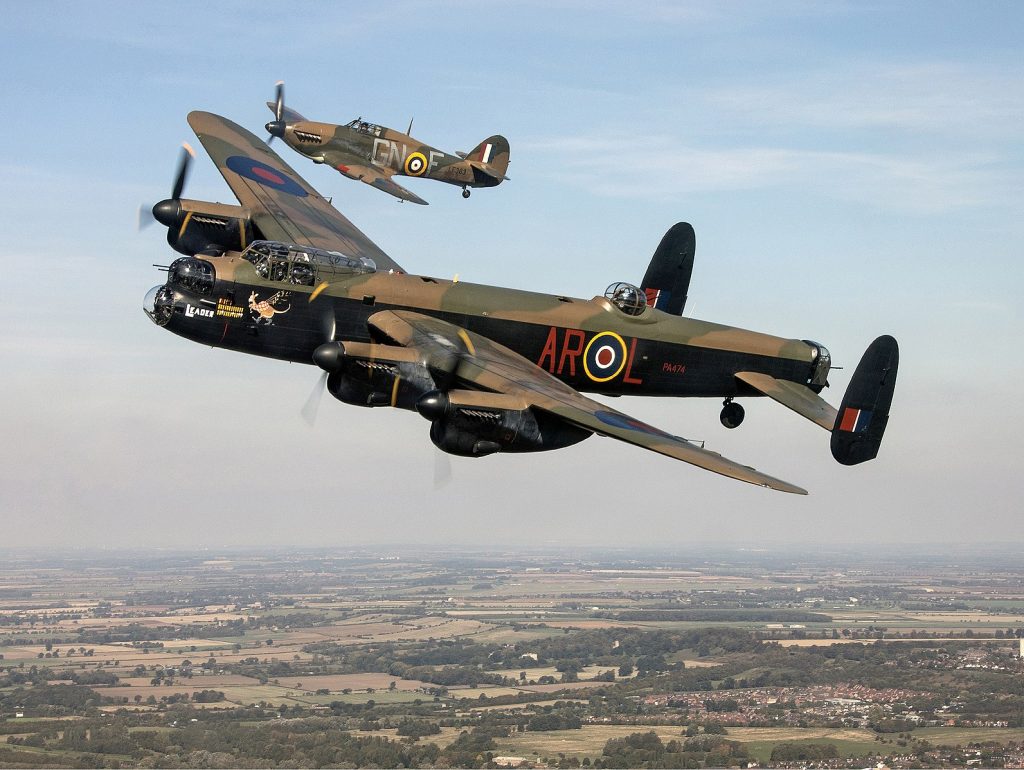
Lancaster Bomber being escorted by a Hawker Hurricane
September 17, 2019
Finest Hour 185, Third Quarter 2019
Page 24
By Roddy Mackenzie
Roddy MacKenzie is a retired Canadian lawyer and son of a Bomber Command pilot. This article is based on his 29 January 2019 address to the Churchill Society of British Columbia.
“The real cause of Germany’s defeat was the failure of the German Air Force.”—Hitler1
Winston Churchill was involved from the beginning. During the First World War, Prime Minister David Lloyd George appointed Churchill Minister of Munitions in July 1917. Churchill was exceptionally effective. His many responsibilities included overseeing the supply of the new Royal Air Force following its creation on 1 April 1918. By 1919, Churchill was both Secretary of State for War and Air. He concocted with Air Chief Marshal Sir Hugh Trenchard (the “Father of the RAF”) “methods of using bombers to control large areas of sparsely populated territory” through “force substitution.”2 This was important, because the two men viewed air power as possessing both offensive and defensive capabilities. This belief was used to overcome pressure from the British Army and Royal Navy to disband the RAF as a separate service. The United States had no Churchill-Trenchard equivalent at the end of the First World War, and so America’s Army and Navy succeeded in preventing the creation of a separate US Air Force until 1947. Churchill’s enthusiasm made the RAF for many years the largest air force in the world. Further, his encouragement of the British air construction industry helped save Britain in the Second World War.
Churchill’s View of Bomber Command
With anyone but Churchill as Prime Minister in May 1940, Britain would most likely have negotiated peace with Hitler. Additionally, without Churchill, Bomber Command would most likely have been sidelined early in the war because of the horrific cost in crewmen killed and aircraft lost. But Churchill, with singular clarity, saw Bomber Command as vital to victory. In September 1940, the first anniversary of the beginning of the Second World War, Churchill said in a memo to the Cabinet: “The Navy can lose us the war but only the Air Force can win it….The Fighters are our salvation… but the Bombers alone provide the means of victory.”3
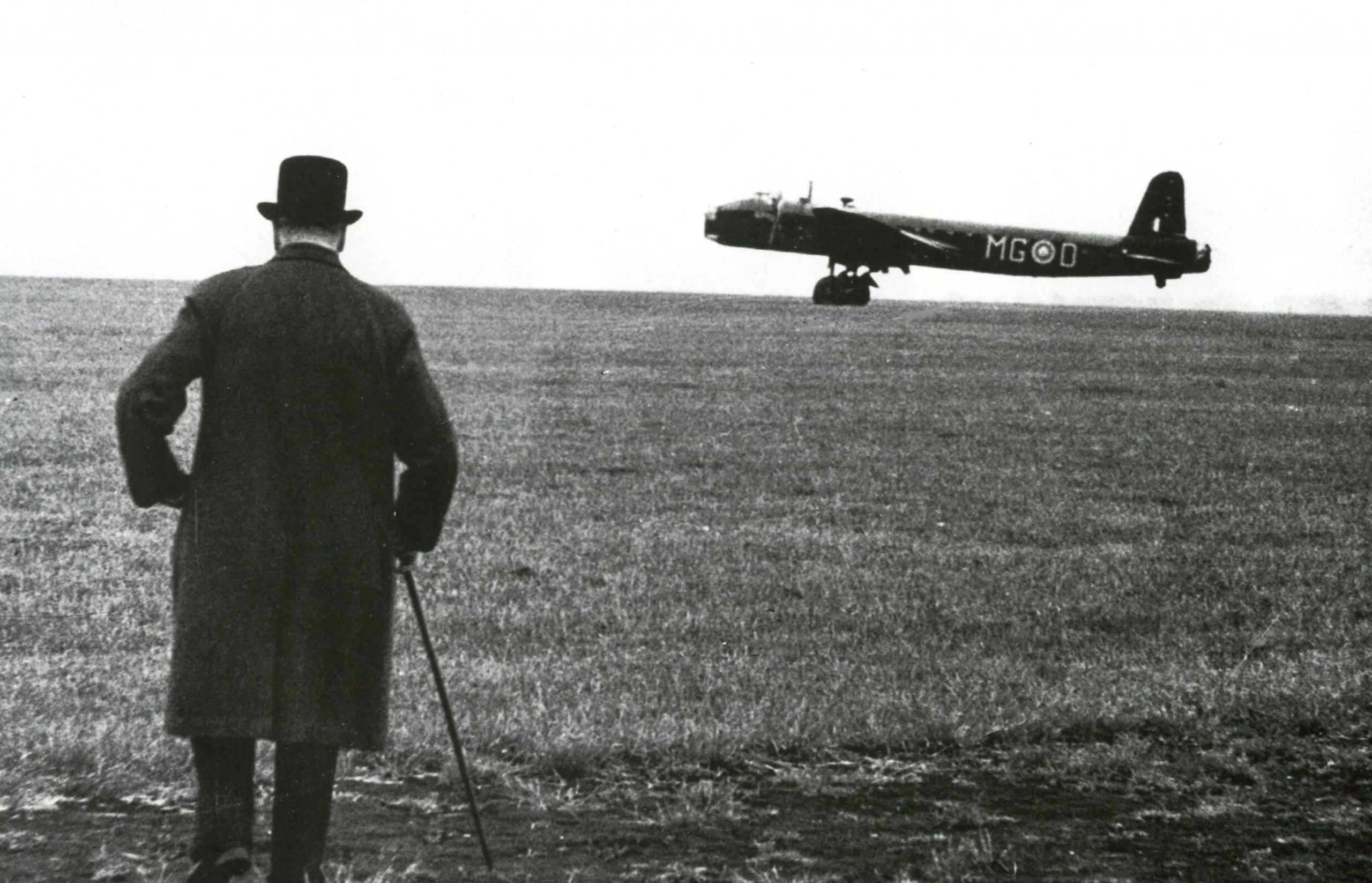
A myth has arisen about “The Few,” which needs to be dispelled. Churchill’s immortal words praising “The Few” refer not just to Fighter Command. They refer to all RAF airmen. Here are the three sentences Churchill spoke in Parliament on 20 August 1940:
The gratitude of every home in our Island, in our Empire, and indeed throughout the world, except in the abodes of the guilty, goes out to the British airmen who, undaunted by odds, unwearied in their constant challenge and mortal danger, are turning the tide of world war by their prowess and by their devotion. Never in the field of human has so much been owed by so many to so few. All hearts go out to the fighter pilots whose brilliant actions we see with our own eyes day after day, but we must never forget that all the time, night after night, month after month, our bomber squadrons travel far into Germany, find their targets in the darkness by the highest navigational skill, aim their attacks, often under the heaviest fire, often with serious loss, with deliberate careful discrimination, and inflict shattering blows upon the whole of the technical and war-making structure of the Nazi power.4
What Was Bomber Command?
Bomber Command was the Commonwealth’s use of airpower to attack Nazi-controlled Europe. The Air Forces of Australia, Britain, Canada, and New Zealand (the Irish Free State was neutral, and South Africa focused on the African air war) came together in a single seamless unit of ever-increasing power and effectiveness. From 22 February 1942 to the end of the war, Bomber Command was led by Air Chief Marshal Sir Arthur Harris. The VIII Bomber Command (the “Mighty Eighth”) of the United States Army Air Force (USAAF) joined these forces in the UK on 17 August 1942.
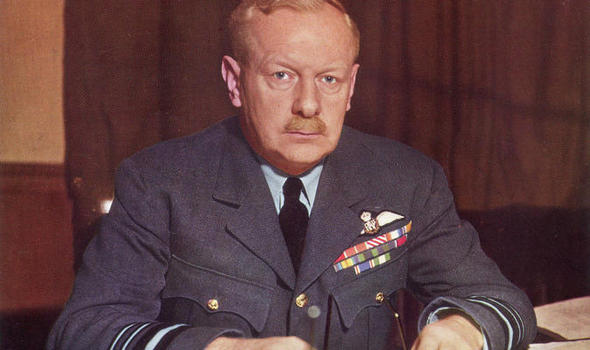
Of Bomber Command’s 125,000 aircrew, 20,000 were Australians, 6,000 were New Zealanders, and 50,000 came from Canada. Bomber Command’s accomplishments came at a horrific cost. One source says Bomber Command sustained 79,281 casualties, and America 79,265. Of Bomber Command’s casualties, 55,573 were killed, 72% of whom were British. More than 9,000 Bomber Command aircraft were destroyed. One out of every four Canadians killed in the war died in Bomber Command, and one out of every five Australians killed died serving in the Royal Air Force.
Take my Dad’s Squadron as an example. The Royal Canadian Air Force (RCAF) seconded my father, Roland W. MacKenzie DFC, to the RAF. There he piloted a Lancaster in Bomber Command’s 166 Squadron for thirty-four combat sorties from April to August 1944. His squadron flew from January 1943 until the end of the war. In those fifty-two months, 944 aircrew in 166 Squadron were killed. Their average age was twenty-three. Of these, 148 were Canadians, forty-five were Australians, and eleven were New Zealanders. Most RAF Squadrons had multiple Commonwealth airmen in their aircrews. The losses were horrific, but the results were vital to victory.
Bomber Command Controversies
While hailed as heroic during most of the war, Bomber Command became a subject of controversy afterwards. The three most divisive subjects are bombing accuracy, the ethics of bombing cities, and Dresden.
Bombing accuracy was brought into question by David Butt’s Cabinet Report of August 1941, which the RAF disputed but Churchill believed. It led to the British Area Bombing Directive of 15 February 1942, which was in turn replaced by the Casablanca Directive of 4 February 1943. These Directives aroused debate about the merits of precision bombing versus area bombing. What many decision makers during the Second World War failed to understand, however, was that this was oftentimes a distinction without a difference. The necessary technology for precision bombing developed only gradually during the war. Bombing accuracy and effectiveness steadily improved as the war progressed, with the introduction of every latest innovation, and especially when Bomber Command created “Pathfinders” to locate and mark targets.
The ethics of bombing cities arose from the reality that most German heavy industry was located in cities—and so ipso facto were the workers. Given the Allies’ demand at Casablanca for unconditional surrender, the only way to defeat the Nazis was to destroy Germany’s ability to wage war. What would have been unethical was losing the war, a very real possibility in the first two years, or suffering the large-scale massacres of Allied soldiers such as happened in 1914–1918. The United Kingdom, for example, lost three times as many soldiers in the first war as it did in the second. The Allied Strategic Bombing Offensive therefore proceeded and, in so doing, achieved its primary objectives of saving the lives of hundreds of thousands of Allied soldiers by shortening the war.
Dresden was bombed on 13–15 February 1945 by 769 British and 527 American heavy bombers. City officials telegraphed Berlin that about 20,000 were killed. Joseph Goebbels’ Propaganda Ministry simply added a zero to make this figure 200,000. The Nazis correctly noted that Dresden was an historic, medieval town but also falsely claimed that it was of no military value. In fact, it was a major industrial, communications, and railway centre with about 50,000 workers in war-related factories. Many people still believe both Nazi lies today. In response to an Associated Press report on 17 February 1945 speculating terror bombing, US Army Chief General George C. Marshall stated that Dresden was bombed at the request of the Russians.5 That put an end to Dresden as an American controversy, but Churchill’s silence led to the bombing becoming an ongoing Commonwealth controversy.
Roy Jenkins states in his biography of Churchill that the Prime Minister’s decision in late January 1945 to intensify area bombing was founded on Churchill’s belief that this would decisively shorten the war.6 Britain wanted this war to end, and so did America. Through its “Germany First” policy, America had two-thirds of its fighting force in Europe and only one-third fighting Japan. With Germany seemingly finished, Americans were becoming anxious to transfer their forces to the Pacific. In addition, relations with Stalin were deteriorating. From all this, German leaders had reason to believe that if their armies could dig into fixed positions in Northern Europe as they had already done in Italy, they could conduct a defensive war long enough to force the western Allies into a negotiated peace. The Strategic Bombing Offensive’s escalation, however, destroyed Germany’s means to continue making war and forced the surrender of more than three million soldiers who were no longer equipped to fight.
On 28 March 1945, presumably to distance himself politically from Bomber Command, Churchill signaled General Ismay: “It seems to me that the moment has come when the question of bombing of German cities simply for the sake of increasing the terror, though under other pretexts, should be reviewed…. [and] acts of terror and wanton destruction…” should now cease.7 This implied terror bombing was taking place.
The Chief of Air Staff, Sir Charles Portal, asked Harris for an immediate rebuttal, persuaded Churchill to withdraw his erroneous signal, and demanded Ismay destroy his copy. Churchill did and Ismay promised to, but did not. The reply Harris sent that day said in part: “We have never gone in for terror bombing and the attacks which we have made in accordance with my Directive have in fact produced the strategic consequences for which they were designed and from which the Armies now profit…. Attacks on cities, like any other act of war, are intolerable unless they are strategically justified. But they are strategically justified in so far as they tend to shorten the war and so preserve the lives of Allied soldiers.”8
Churchill should have harnessed his extraordinary oratorial skills to articulate the supreme importance of Bomber Command in the spring of 1945. Instead, he sank into silence. In spite of this, Churchill and Harris remained friends and respectful of one another’s considerable talents. At Churchill’s funeral, Harris was accorded the singular honour of serving as an honorary pallbearer.
Bomber Command’s Accomplishments
This brings us to the supreme question: what did Bomber Command accomplish? According to the Canadian government’s website:
The efforts of the approximately 50,000 Canadians who served with the Royal Canadian Air Force (RCAF) and the Royal Air Force (RAF) in Bomber Command operations over occupied Europe were one of our country’s most significant contributions during the Second World War….
The men who served in Bomber Command faced some of the most difficult odds of anyone fighting in the war. For much of the conflict, the regular duration for a tour of duty was 30 combat sorties. The risks were so high, however, that almost half of all aircrew never made it to the end of their tour. Despite the heavy losses, Bomber Command was able to maintain a steady stream of aircraft flying over U-boat bases, docks, railways and industrial cities in Germany, as well as enemy targets in occupied Europe.9
Although the Canadian historical view is clear, only the Germans who experienced the attacks at the time really knew what was being accomplished. And what did the Germans say? Field Marshal Erwin Rommel told his superiors: “If you can’t stop the bombing, we can’t win the war.” Reich Marshal Hermann Goering, Field Marshal of the Luftwaffe Albert Kessselring, General Karl Koller, Field Marshal Erhard Milch, General Sepp Dietrich, and Field Marshal Gerd Von Rundstedt all attributed Germany’s defeat to Allied air superiority and the Strategic Bombing Offensive.10 Reich Munitions Minister Dr. Albert Speer said Germany’s failure to defeat Bomber Command was Germany’s greatest lost battle of the whole war. He believed the Strategic Bombing Offensive did more damage to the German war effort than losing every battle in Russia, including the surrender of Stalingrad, because bombing continuously damaged with ever increasing ferocity, and then ultimately destroyed, Germany’s ability to produce the means necessary to make war.
Eisenhower and Churchill—The Last Words
Supreme Allied Commander General Dwight D. Eisenhower wrote to reassure his superior General Marshall that return of control of Bomber Command to the British in September 1944 would work well. Eisenhower said he had come to regard British Bomber Command as one of the most effective parts of his entire organization, always seeking and finding and using new ways for their particular type of aircraft to be of assistance in forwarding the progress of the Armies on the ground.
Churchill’s famously failed to mention Bomber Command in his victory speech praising the Armed Forces. But a copy of the following telegram from Churchill to Harris, dated 15 May 1945—just one week after the German surrender—is to be found in the Churchill archives:
Now that Nazi Germany is defeated, I wish to express to you on behalf of His Majesty’s Government the deep sense of gratitude which is felt by all the Nation for the glorious part which has been played by Bomber Command in forging the Victory.
For over two years, Bomber Command alone carried the war to the heart of Germany, bringing hope to the peoples of occupied Europe, and to the enemy a foretaste of the mighty power which was rising against him. As the Command expended [sic], in partnership with the Air Forces of our American Ally, the weight of the attacks was increased, dealing destruction on an unparalleled scale to the German Military, Industrial and Economic System. Your Command also gave powerful support to the Allied Armies in Europe and made a vital contribution to the war at sea. You destroyed or damaged many of the enemy’s ships of war and much of his U-Boat organization. By a prolonged series of mining operations you sank or damaged large quantities of his merchant shipping. All your operations were planned with great care and skill; they were executed in the face of desperate opposition and appalling hazards; they made a decisive contribution to Germany’s final defeat.
The conduct of these operations demonstrated the fiery gallant spirit which animated your aircrews and the high sense of duty of all ranks under your Command.
I believe that the massive achievements of Bomber Command will long be remembered as an example of duty nobly done.
WINSTON S. CHURCHILL11
This telegram is the clearest statement I have seen by any British official regarding what Bomber Command accomplished. In addition, Churchill declared in his war memoirs:
But it would be wrong to end without paying our tribute of respect and admiration to the officers and men who fought and died in this fearful battle of the air, the like of which had never before been known, or even with any precision imagined. The moral tests to which the crew of a bomber were subjected reached the extreme limits of human valour and sacrifice. Here chance was carried to its most extreme and violent degree above all else.
They never flinched or failed. It is to their devotion that in no small measure we owe our victory. Let us give them our salute.12
Let us indeed! Bomber Command was Churchill’s greatest triumph.
Endnotes
1. Richard Overy, “World War II: How the Allies Won,” BBC. co.uk, 17 February 2011.
2. Patrick Bishop, Air Force Blue: The RAF in World War Two (London: HarperCollins, 2018), p. 35.
3. Ibid., p. 180.
4. David Cannadine, ed., Blood, Toil, Tears, and Sweat: The Speeches of Winston Churchill (Boston: Houghton Mifflin, 1989), p. 188.
5. Patrick Bishop, Bomber Boys: Fighting Back 1940–1945 (London: Harper, 2008), p. 347.
6. Roy Jenkins, Churchill: A Biography (London: Macmillan 2001), p. 777.
7. Henry Probert, Bomber Harris (London: Greenhill, 2011), p. 321.
8. Alan Cooper, Target Dresden (London: Independent, 1995), p. 196.
10. Cooper, pp. 217–32.
11. CHAR 20/229, Churchill Archives Centre, Cambridge.
12. Winston S. Churchill, Closing the Ring (New York: Houghton Mifflin, 1951), pp. 468–69.
Subscribe
WANT MORE?
Get the Churchill Bulletin delivered to your inbox once a month.


